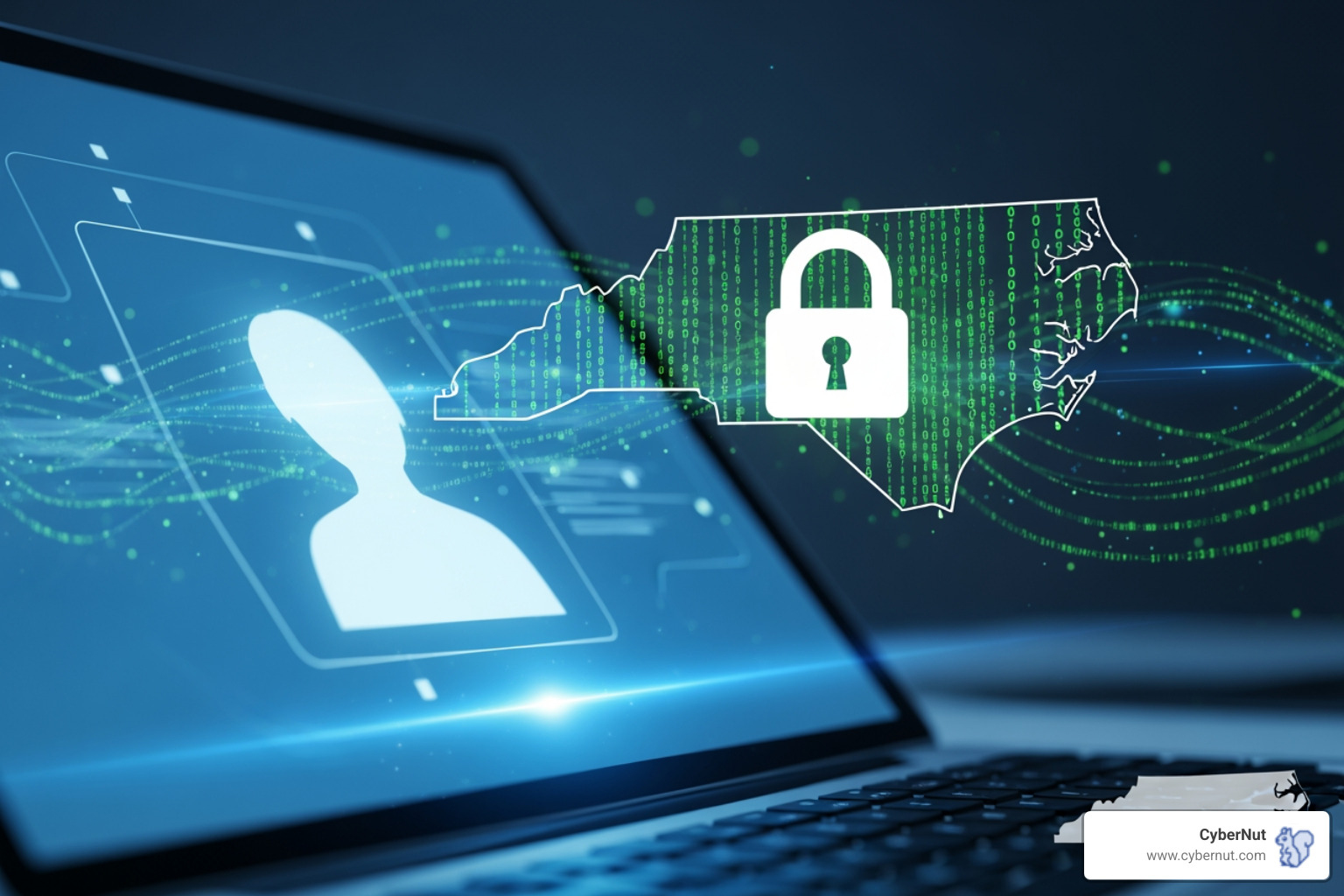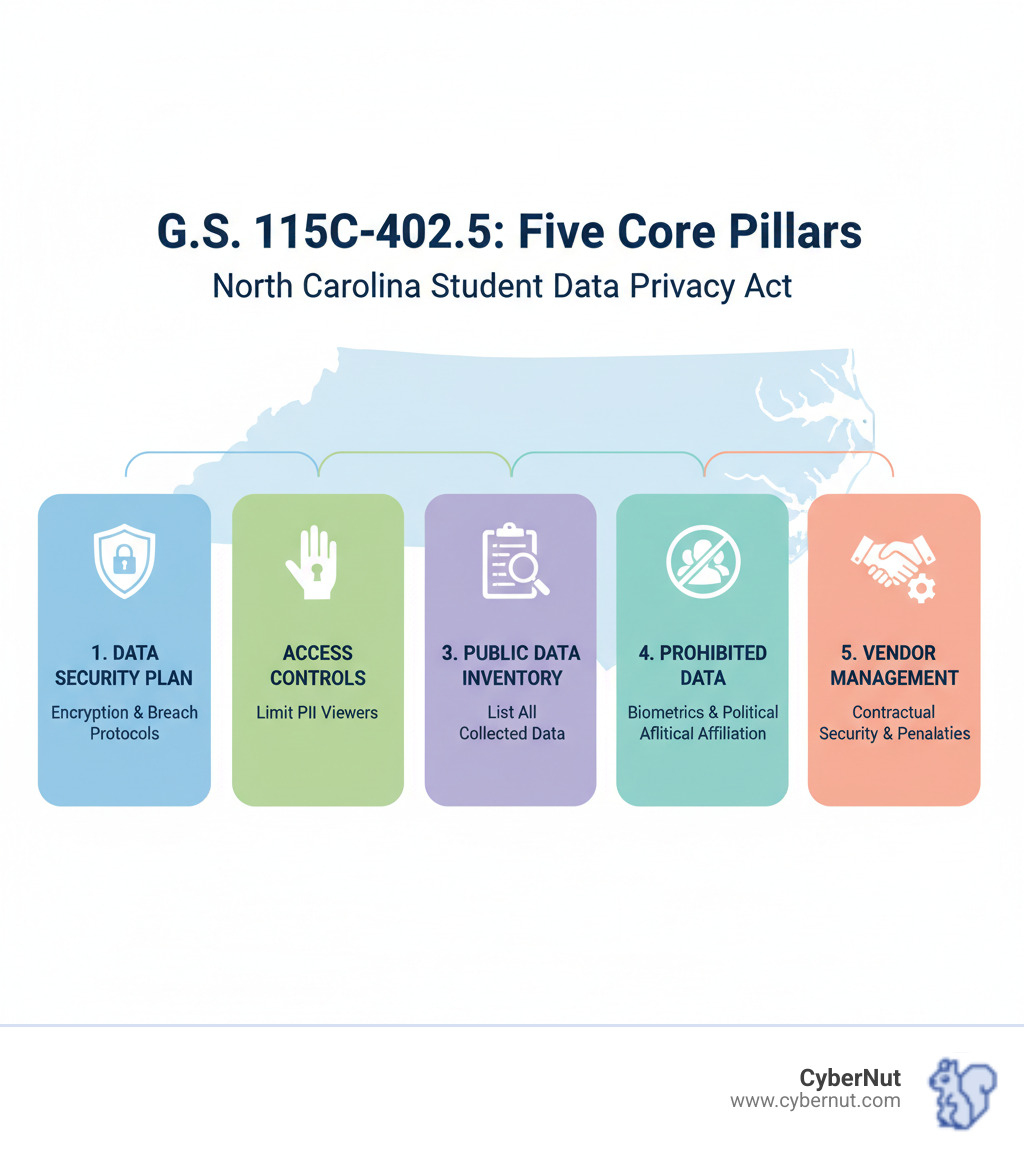
Oliver Page
Case study
November 13, 2025

All About North Carolina's Student Data Privacy Act (G.S. 115C-402.5) is a critical compliance obligation for K-12 IT Directors in North Carolina. This statute establishes specific security requirements to protect personally identifiable student information (PII).
Quick Overview of G.S. 115C-402.5:
Enacted in 2014, G.S. 115C-402.5 goes beyond the federal baseline set by FERPA by mandating specific technical safeguards and prohibiting certain data collection. For IT Directors, this requires a comprehensive data security plan that includes employee training, breach notification procedures, data encryption, and strict vendor management.
The stakes are high, as schools store sensitive data like social security numbers, health records, and academic performance. A breach can lead to identity theft for students and significant financial and reputational damage for a district. Understanding and implementing G.S. 115C-402.5 is essential for protecting students, maintaining funding, and building trust with your community.

All About North Carolina’s Student Data Privacy Act (G.S. 115C-402.5) glossary:
To manage student data in North Carolina, you must understand what All About North Carolina's Student Data Privacy Act (G.S. 115C-402.5) requires. This law creates clear rules for how the State Board of Education, the Department of Public Instruction, and local school districts must safeguard student information, focusing on transparency, accessibility, and accountability.

G.S. 115C-402.5 protects Personally Identifiable Student Data (PII), which is any information that could identify a specific student. This includes obvious identifiers like a name or Social Security number, as well as indirect identifiers like a date of birth or mother's maiden name. The law uses a "reasonable person" standard: if someone in the community could identify a student from the data, it's considered PII.
Directory information (e.g., name, participation in activities, awards) is an exception and can be shared publicly. However, if a parent opts out of this disclosure, that information becomes protected PII for their child.
The law explicitly prohibits collecting four types of data in the student data system:
G.S. 115C-402.5 mandates a comprehensive, written data security plan. The State Board of Education develops this plan, and local districts must align their practices. Key components include:
A critical and often overlooked requirement is comprehensive employee training for everyone who handles student data. Technology alone is not enough. Your staff is the first line of defense against phishing and social engineering. Regular, engaging training on security practices is not just a compliance checkbox—it's essential for building a strong security culture.
Want to see how vulnerable your school currently is to phishing attacks? We offer a free phishing audit that shows you exactly where your risks are. It's a proactive step toward fulfilling the training requirements of G.S. 115C-402.5 and protecting your school.
All About North Carolina's Student Data Privacy Act (G.S. 115C-402.5) sets clear boundaries on who can access student data, how it can be transferred, and how it can be used for research.

Access to PII is restricted to those with a legitimate educational need. The law permits access for:
Schools rely on third-party vendors, and G.S. 115C-402.5 provides guidelines for protecting data when it leaves your direct control.
Any contract with a private contractor involving student data must include express provisions for privacy and security. These contracts must define what the vendor can do with the data, what security measures are required, and how long they can retain it. Crucially, contracts must also include penalties for noncompliance to ensure vendors are held accountable.
The Act generally prohibits the unauthorized transfer of PII out of state, with exceptions for when a student enrolls in a school outside North Carolina or when a local unit needs help locating a formerly enrolled student.
The Act balances educational research with student privacy through a structured approval process. The NCDPI Research Review Committee evaluates all requests based on criteria developed by the State Board of Education.
Researchers seeking record-level or identifiable data must submit a Research Data Request Form and demonstrate a legitimate research purpose. They must agree to strict data security and destruction protocols. To minimize risk, NCDPI often provides de-identified data sets through partners like the North Carolina Education Research Data Center (NCERDC) at Duke University. This allows valuable research to proceed while keeping student identities protected.
All About North Carolina's Student Data Privacy Act (G.S. 115C-402.5) operates within a web of federal and state laws. IT Directors must ensure compliance with all of them.

G.S. 115C-402.5 does not replace federal laws but adds more specific protections.
G.S. 115C-402.15 requires local boards to provide annual notification to parents about all these rights, ensuring they are informed and empowered.
While the state sets the framework, local school units have key responsibilities:
When a data breach occurs, schools must follow specific notification steps outlined in the North Carolina Identity Theft Protection Act (NCGS Chapter 75, Article 2A), which applies to all government entities, including schools.
A security breach is defined as the unauthorized access and acquisition of unencrypted personal information that creates a material risk of harm. If encrypted data is stolen along with the key, it also counts as a breach.
If a breach occurs, schools must:
Having a clear, practiced breach response plan, as mandated by G.S. 115C-402.5, is critical to managing an incident effectively.
Here are answers to common questions about All About North Carolina's Student Data Privacy Act (G.S. 115C-402.5).
Think of FERPA as the federal floor for student privacy, focusing on parental rights to access, amend, and control the disclosure of education records. G.S. 115C-402.5 is the state-level structure built on that floor. It is more prescriptive, mandating a specific data security plan, prohibiting the collection of certain data (like biometrics and political affiliation), and requiring detailed vendor contract safeguards with penalties. You must comply with both.
No, but they have significant control. Parents can opt out of the disclosure of directory information (e.g., name in a yearbook). They must opt in (give affirmative consent) for their child to take protected information surveys on sensitive topics. However, parents cannot opt out of the collection of essential data required for educational purposes, such as grades, attendance records, and test scores, which are necessary for the school to function and meet legal requirements.
The school, as the data owner, remains ultimately responsible. G.S. 115C-402.5 requires your vendor contracts to include express provisions for data security and penalties for noncompliance. If a vendor has a breach, your school is responsible for ensuring that all notification duties under North Carolina's Identity Theft Protection Act are met. This includes notifying affected families, the North Carolina Attorney General's Office, and, if necessary, consumer reporting agencies.
This highlights the importance of thorough vendor vetting and strong contracts. However, many breaches start with a simple phishing email. To see how vulnerable your staff might be, consider a free phishing audit to identify risks before an attack occurs.
All About North Carolina's Student Data Privacy Act (G.S. 115C-402.5), along with FERPA and the Parents' Bill of Rights, creates a comprehensive privacy ecosystem for student data. It mandates security plans, access controls, and robust vendor management to keep student information safe.
However, laws and policies are only as effective as the people implementing them. For K-12 IT Directors, the real work is building a proactive security culture. This includes regular audits, practiced breach response plans, and strong vendor oversight.
We've learned that the most sophisticated technology can be defeated by a single employee clicking a malicious link. This is why G.S. 115C-402.5 specifically requires employee training. The human element is your greatest vulnerability and your strongest defense.
At CyberNut, we provide automated, gamified micro-trainings designed for K-12 schools to build phishing awareness without adding to your workload.
Don't wait for a breach to find your weaknesses. Find out how vulnerable your school is with a free phishing audit. It’s a fast, clear way to assess your risk.
Protecting student data is about honoring the trust families place in you. For more insights on strengthening your school's cybersecurity, explore our cybersecurity resources.

Oliver Page

Some more Insigths


Back